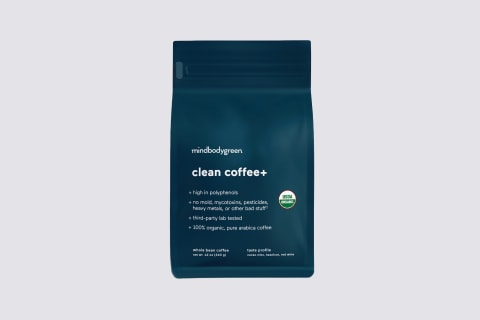Advertisement
How Coffee Affects The Inflammatory Response & How To Combat It


Some days (most days), the thought of coffee is the only thing that gets me out of bed in the morning. And if you try to talk to me before I've had my first cup? Forget about it. But while there's certainly a comfort factor to a steaming (or iced, if that's the way you roll) cup of joe, there's also a lot of discussion about how coffee can fit (or whether it does fit) into a healthy lifestyle.
One of the biggest questions popping up lately is whether or not coffee affects the body's inflammatory response. Turns out, it can, but it can also provide anti-inflammatory properties, depending on who you are and how much you drink.
We talked to the experts to get the scoop on how coffee affects inflammatory pathways in our body, and whether they think you should keep or ditch your morning brew.
Does coffee affect the inflammatory response?
While you might just think of it as your favorite drink, coffee is loaded with several beneficial compounds (actually hundreds!1), most notably polyphenols—antioxidant-rich compounds that naturally occur in plants. "Research shows coffee can have pro- or anti-inflammatory effects2, depending on the individual," says Vincent M. Pedre, M.D., a board-certified internist with a focus on integrative health. Let's dive into that research.
One clinical research study3 looked at a large pool of data and found that these polyphenols could specifically help a handful of inflammatory markers, including cytokines, chemokines, and basic fibroblast growth factor (FGF-2). What's more, the heavier the coffee intake, the more significant the impact.
One of the major polyphenols in coffee is chlorogenic acid. This astringent compound is largely responsible for how your coffee tastes, but it also has a significant positive effect on inflammatory pathways. Researchers from a study in the European Journal of Nutrition4 not only credited the chlorogenic acid in coffee with anti-inflammatory properties but also with providing metabolic and cardiovascular health benefits.
An important note, though: We're talking about coffee in its purest form here. This doesn't apply to sugar-laden coffee beverages—those are a whole different beast. If you prefer your coffee with add-ins, consider something on the more nutrient-dense side, like mbg's beauty and gut collagen+, which comes in a delicious, not-overly-sweet (actually, zero sugar) chocolate variety. (Everything to know about collagen in coffee and our favorite ways to use it, here.)
What about caffeine?
Of course, we have to address the elephant in the room: caffeine. Caffeine isn't exclusive to coffee, of course, but coffee is one of the biggest dietary contributors5 of this phytonutrient stimulant.
And while all coffee contains anti-inflammatory compounds, whether or not it affects the inflammatory response can depend on the concentration of caffeine, how your body reacts to caffeine, your genetics, and your age. "Everyone is different, and everyone will have different setpoints regarding how much caffeine they can tolerate and should drink," says integrative gastroenterologist Marvin Singh, M.D.
Caffeine can trigger your stress response, releasing cortisol in the process. While cortisol is anti-inflammatory by nature, prolonged levels can have the opposite effect6.
"It is important to note that everyone may have a different threshold for how much is too much for them," Singh says. "We each metabolize caffeine differently. Some people are fast metabolizers, and others are slow metabolizers, so this will affect how much you are likely able to tolerate."
If you're particularly sensitive to the botanical stimulant or a slow metabolizer—meaning, thanks to your genetics, it takes longer for caffeine to move through your system—it can exacerbate that stress response as well as contribute to nerves, a racing heart, and jitters, among other signs of heightened stress. One study in the Journal of the American Medical Association7 even linked caffeine and heart-health outcomes (but not people who metabolize caffeine at a normal rate), although it wasn't totally clear whether this could be attributed to coffee's impact on the inflammatory response.
Pedre also points out that too much caffeine, or more than 150 milligrams (the amount you'd get from a 20-ounce cup of coffee), can increase insulin secretion, which leads to cravings for sugar and refined carbohydrates—foods that negatively affect inflammatory pathways.
Even though coffee counts toward your fluid intake, caffeine can also be dehydrating, which can lead to a similar outcome. "I encourage patients to stay ahead of their hydration,'' Pedre says. "Drink at least 64 fluid ounces of clean, filtered water daily, or even more depending on your caffeine habit."
Finally, if you drink too much caffeine, it can interfere with your sleep. And tossing and turning all night isn't just annoying; getting a good night's sleep is essential for a healthy inflammatory response8.
Does decaf coffee cause inflammation?
So, is switching to decaf the answer to enjoying your coffee in a healthy way? It might be. Decaf coffee contains all of the same anti-inflammatory compounds9 as caffeinated coffee, so it's likely that you reap the benefits of the polyphenols without the potential negative effects of caffeine.
However, more research is still needed here. It's also a good idea to note that decaf coffee can still contain some caffeine, usually around zero to 15 milligrams per cup. For comparison, a cup of coffee contains around 96 milligrams.
The takeaway
Coffee is rich in antioxidant polyphenols, but the caffeine can be pro-inflammatory if you overdo it and depends on your personal biological makeup. To reap the anti-inflammatory properties of coffee without the negative effects (or the jitters or sleep disturbance), limit your intake to one to two cups per day or switch to decaf.
9 Sources
- https://pubs.acs.org/doi/10.1021/acs.jafc.0c05937#:~:text=Mass%20spectrometry%20analyses%20tentatively%20identified,identifications%20in%20a%20single%20study.
- https://www.ncbi.nlm.nih.gov/pubmed/27425673
- https://www.ncbi.nlm.nih.gov/labs/pmc/articles/PMC4490956/
- https://pubmed.ncbi.nlm.nih.gov/28391515/
- https://www.ncbi.nlm.nih.gov/pmc/articles/PMC4808882/
- https://www.ncbi.nlm.nih.gov/labs/pmc/articles/PMC4263906/
- https://jamanetwork.com/journals/jama/fullarticle/202502
- https://www.ncbi.nlm.nih.gov/labs/pmc/articles/PMC4666828/
- https://www.ncbi.nlm.nih.gov/pmc/articles/PMC5696634/
